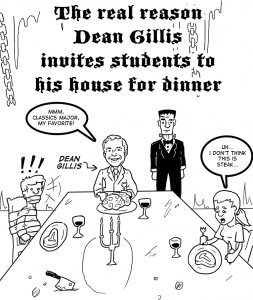Over the past week, I have spoken out against the various events and advertised mission of Sex Positive Week, co-sponsored by GU Pride, United Feminists, and the Georgetown Solidarity Committee. I hope to clarify the purpose of my opposition and to make two arguments clear.
First, Sex Positive Week—as it occurred and was advertised—is fundamentally inconsistent with Georgetown’s Jesuit-Catholic identity, and therefore should have not been supported by the University.
Second, the message espoused by the events of Sex Positive Week is not only inconsistent with the stated missions of its co-sponsoring organizations, but in fact demeans the homosexual and feminist communities.
Given Georgetown’s rich heritage—grounded in the teachings of the Roman Catholic Church and the mission of the Society of Jesus, to bring Christ to the world and the world to Christ—Georgetown ought to provide a venue in which students can receive an education which exposes them to all points of view and perspectives.
As such, any event which advertises and exposes students to teachings which directly contradict the teachings of the Church ought to have a proper counterweight present and ought to include Jesuits and educated Catholics present in the discussion, in order to better inform the beliefs and understandings of students who might be opposed to Catholic teaching. Without this engagement, Georgetown fails to provide its students with a thoughtful and informed education.
Jesuits were invited to a few of Sex Positive Week’s events by the director of the LGBTQ Center, Shiva Subbarama. However, their invitation was revoked when a few student organizers expressed their discontent with this decision. The revocation of the Jesuits’ invitation strikes me as fundamentally egregious, given that true dialogue was not encouraged but rather stifled.
Let me be clear: I am not calling for censorship of Sex Positive Week, but rather a transformation of the structure of the dialogue, so as to include the all perspectives on human sexuality. My hope is that in the future, Sex Positive Week will be co-sponsored by more student groups, including those that are faith-based.
To be perfectly honest, there are many campus cultures which remain isolated and insular, and I expect that the controversy surrounding Sex Positive Week will provide us all with a genuine opportunity to emerge from our respective caves, to begin to engage and converse, and to establish meaningful relationships with those with whom we might not agree.
Is this not the point of a college education—to expose us to all that our world has to offer us? I believe the tangible hostility and animosity that exists between select student groups is grounded in a profound ignorance. Thus, I am calling for a breakdown of these barriers through proper dialogue.
Additionally, I am unsure as to how Sex Positive Week empowers women and how it eliminates “prejudice and discrimination based on sexual orientation or gender identity” (one of GU Pride’s primary stated goals, according to their website). It seems to me that Sex Positive Week in fact demeans the homosexual and feminist communities, reinforcing ignorant stereotypes and assumptions with generalizations that members of these communities are obsessed with pornography, polygamous/polyamorous relationships, and radically alternative sexual lifestyles. This is, in fact, how the week was advertised. The Week’s vulgar and offensive flyers simply served to engender dangerous stereotypes, and its events gave a rather insincere, and therefore unhealthy, impression of the homosexual and feminist communities.
I know a number of feminists and homosexuals who found Sex Positive Week to be conclusively disingenuous and destructive to their respective identities, and it is quite surprising that GU Pride and United Feminists would care to represent members of the homosexual and feminist communities in such an inauthentic manner.
In the future, Georgetown ought to provide students with helpful and healthy venues for discussing human sexuality. What we need is a Sex Positive Week that includes all perspectives in its discussion and debate, a Sex Positive Week which will provide us with a true educational experience.
This year, Sex Positive Week only served to promote dangerous stereotypes through events and discussions which are fundamentally inconsistent with Georgetown’s identity as a Jesuit university. Simply put, we deserve better.
Sex Positive Week: Events were counterproductive and one-sided
March 5, 2009





Who’s to say that educated Catholics were not in attendance for Sex Positive Week? I have enjoyed a Catholic education since the age of 5 and consider myself well-versed in Catholic teaching. Had you attended several events, perhaps you would’ve seen that many voices were present in discussing sex positivity: Catholic, Atheist, gay, straight, and many in between.
Georgetown already succeeds in presenting the Catholic view on sexuality, premarital sex, and contraception. If not, perhaps condoms would be available for purchase from the Corp. Aspects of Sex Positive Week, then, can be seen as inclusive of other perspectives that are not typically heard on campus.
Finally, be careful in how you discuss the identities of feminists and homosexuals. There is rarely one cohesive identity that encapsulates members of a community whether gay, feminist, or other. The fact that some from different communities disagreed with perspectives presented in Sex Positive Week is testament to its success! It provided a forum where students could agree or disagree and where many points of view could be shared. I hope you attended some of the events so that your voice could be heard.